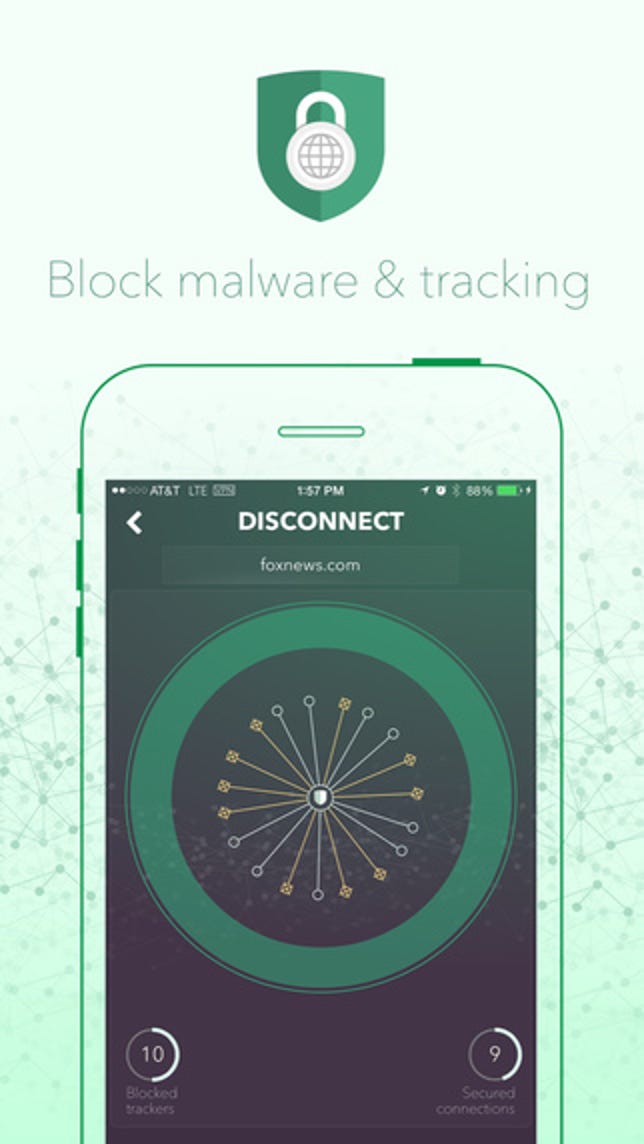
Disconnect
Already under investigation by regulators in Europe, a new complaint against Google claims its ban of one privacy application violates antitrust regulations.
Disconnect, the maker of a privacy app that stops surreptitious user tracking and malicious advertising, filed a complaint with the European Union on Tuesday. The complaint argues that Google’s decision last year to remove Disconnect’s app from the Google Play store was an abuse of its “dominant position on Android, the Play Store, and Chrome mobile.”
“We don’t oppose advertising and understand ad revenue is critically important to many Internet companies, publishers and developers,” Disconnect Co-founder and CEO Casey Oppenheim said on Tuesday. “But users have the right to protect themselves from invisible tracking and malware, both of which put sensitive personal information at risk. Advertising doesn’t have to violate user privacy and security.”
Google has called the complaint “baseless” and says the Disconnect app violates its policies.
The complaint underscores the increased scrutiny Google faces as it looks to expand the influence of its Android mobile operating system — the most popular in the world for smartphones and tablets. Not only is the search giant now forced to address why it removed the app from its Google Play marketplace, but the complaint could be heaped on top of an ongoing European Commission investigation into Android. Regulators are concerned with how the search giant exerts its power, especially as more of the world migrates from desktop computers to smartphones and tablets.
In April, EU competition commissioner Margrethe Vestager announced that her office was pursuing antitrust changes against Google for allegedly dominating its position in the search market. Vestager also announced that the European Commission — the executive body of the European Union — has launched a formal investigation into Android, and whether the company’s business practices around it are anticompetitive.
Disconnect pounced on Google’s ongoing issues with the EU, saying that the search giant is using Android in monopolistic ways.
“First, Google has integrated its own ineffective privacy and security ‘features’ into its dominant products, thereby giving itself an unfair market advantage and harming consumers in the process,” the company wrote in a statement. “Second, Google has used its market power to discriminate against Disconnect, by denying Disconnect access to the distribution and other benefits that come with being in the Play Store.”
The second point is perhaps most important to Disconnect. Google removed the Disconnect app (then known as Disconnect Mobile) twice from the Google Play store last year. Google first removed the app at the end of August, telling Disconnect it needed to make tweaks in order to come back. After those tweaks were made, it took just days for Google to again remove Disconnect. The app has since been kept off the Google Play store.
Google has argued that Disconnect violated its app policies. The company said Disconnect “interferes with or accesses another service or product in an unauthorized manner.” Clause 4.4 of Google’s Developer Distribution Agreement specifically prohibits apps from infiltrating other apps and “altering their functionality, or removing their way of making money.”
Disconnect, meanwhile, argued that it was acting not only fairly, but in response to user needs. The free version of Disconnect blocks mobile malware and mobile trackers from running on a device. A $50-per-year premium upgrade adds protection from “malvertising,” or malware that is distributed through ads. The Disconnect app is also available on Apple’s iOS and Mac operating systems, and Microsoft’s Windows.
Related stories
- Why the EU will find Google’s Android isn’t like Microsoft and Windows
- Disconnect Mobile yanked again from Google Play
- US expresses ‘concern’ over EU proposal to break up Google
- Google faces European charge it abused search dominance
In its statement on Tuesday, Disconnect said that its app did not interfere with legitimate ads or tracking. Instead, the company’s app “only blocked ads that were potential sources of malware or if they are used for invisible, unsolicited and non-consensual tracking.” The company also hinted that Google may have gained something by removing Disconnect.
“Currently, Google and others invisibly track vast amounts of personal information about Android users as they use applications and browse the Web,” the company said. “Increasingly, these invisible connections are also used by cybercriminals to distribute malware, steal confidential personal and business information, damage property, and engage in identity theft.”
Google has not backed down from the complaint. In a statement, a company spokesperson said the Android app policies are clear and Disconnect is simply in violation.
“Our Google Play policies (specifically clause 4.4) have long prohibited apps that interfere with other apps,” the spokesperson said. “We apply this policy uniformly — and Android developers strongly support it. All apps must comply with these policies and there’s over 200 privacy apps available in Google Play that do.”
For his part, Oppenheim hasn’t shied away from why his US-based company decided to file a complaint in the EU. While Disconnect could have sued Google in the US, he said the decision was made to take the complaint to the EU because Vestager’s office “opened an Android investigation in April.” He added that the “EU has also taken the lead in protecting user privacy, which is what our app does.”
Disconnect has asked the EU to force Google to reinstate its app in the Android marketplace and treat it “the same as other products that compete with Disconnect.”
The EU did not immediately respond to a request for comment.



